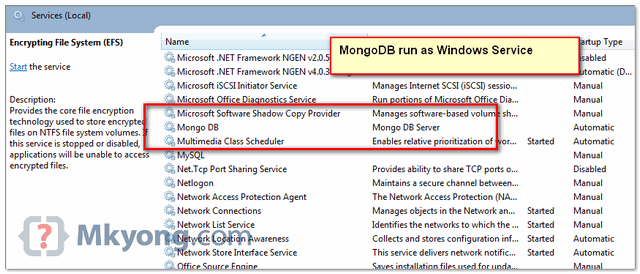1. mongod –help
Get to know all the Windows service related commands by typing “mongod --help“.
C:\MongoDB\bin>mongod --help
Windows Service Control Manager options:
--install install mongodb service
--remove remove mongodb service
--reinstall reinstall mongodb service (equivilant of mongod
--remove followed by mongod --install)
--serviceName arg windows service name
--serviceDisplayName arg windows service display name
--serviceDescription arg windows service description
--serviceUser arg user name service executes as
--servicePassword arg password used to authenticate serviceUser
Two “--install” and “--remove” arguments are what you need.
2. Install as Windows Service
To install as Windows service, issue “mongod --install“, for example :
#> mongod --dbpath "c:\mymongodb" --logpath "c:\mymongodb\logs.txt" --install --serviceName "MongoDB"
all output going to: c:\mymongodb\logs.txt
Creating service MongoDB.
Service creation successful.
Service can be started from the command line via 'net start "MongoDB"'.
It means, install a MongoDB, which point to “c:\mymongodb” data directory, log outputs to “c:\mymongodb\logs.txt“, and a Windows service named “MongoDB“.
Figure : MongoDB is installed as Windows Service
3. Uninstall It
To uninstall above installed MongoDB service, issue “mongod --remove“, along with the installed service name.
#> mongod --remove --serviceName "MongoDB"
Deleting service MongoDB.
Service deleted successfully.
Fri Apr 29 18:39:06 dbexit:
Fri Apr 29 18:39:06 shutdown: going to close listening sockets...
Fri Apr 29 18:39:06 shutdown: going to flush diaglog...
Fri Apr 29 18:39:06 shutdown: going to close sockets...
Fri Apr 29 18:39:06 shutdown: waiting for fs preallocator...
Fri Apr 29 18:39:06 shutdown: closing all files...
Fri Apr 29 18:39:06 closeAllFiles() finished
Fri Apr 29 18:39:06 dbexit: really exiting now
Done.


